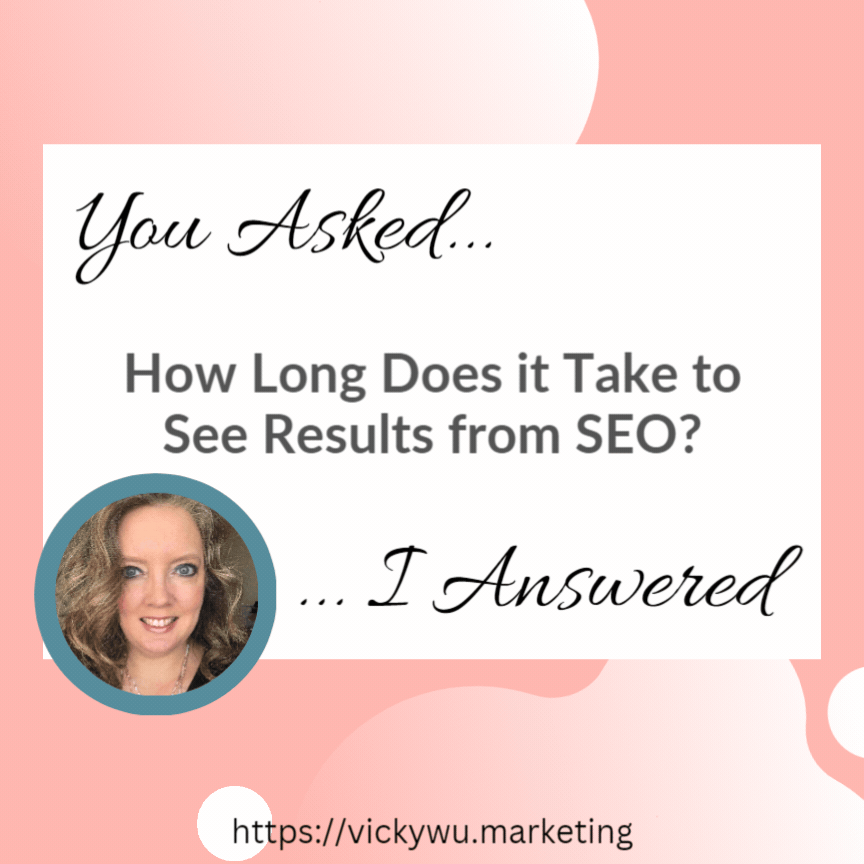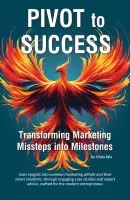Well, you’re right that immediate page 1 results on Google doesn’t seem realistic. That’s ONLY possible with paid ads, assuming that you pay more than all of your competitors.
Paid ads are NOT SEO. When you stop the ads, the results also stop. SEO is a long-term organic strategy that does keep working (assuming that it’s done right.)
Now to answer your question directly:
How long does it take to see results from SEO?
Well … it depends.
And I know that entrepreneurs ALWAYS hate that answer, but it’s the real answer.
It Depends: Factors That Affect SEO Timelines
SEO timelines depend on your industry, budget, and how optimized your site already is.
- Competition: If you’re in a highly competitive field, it can take longer than if you’re targeting a niche market.
- New websites: typically take more time to rank as Google needs to assess your site’s credibility (and frankly they still seem to be running at least two months behind).
- Domain Age: Older domains are often seen as more trustworthy.
- Content Age: Fresh, updated content ranks better than outdated information.
- Content Updates: Regularly updated content signals relevance and helps maintain rankings.
- New Content: Frequent publishing of new, high-quality content increases ranking opportunities.
- Schema Markup: Proper implementation of schema helps search engines understand and display your content more accurately.
- Backlinks: Quality backlinks from authoritative sites are a key ranking factor.
- User Experience: Fast load times, mobile-friendliness, and easy navigation improve rankings.
Other factors that play a part in how quickly you might see SEO results include:
- Budget: Higher budgets allow for faster implementation of optimizations and content creation since more resources can be committed.
- Competition: Industries with more competition, like e-commerce, take longer to see visible results.
- Current State: Websites that already have some SEO groundwork (such as existing decent backlinks or content, and clean technical setup) will see faster results than those starting from scratch.
Best Practices for SEO Efficiency
To maximize your SEO efforts and reduce time to results:
- Header Tags and Structured Content: Organize your content using proper H1, H2, and H3 tags, well-thought hierarchal content structures, and even an efficient menu to improve readability for both users and understanding by search engines. Search engines prioritize structured content that’s easy to crawl because it helps them understand how all of the content works together.
- Content Quality: Focus on, high-quality content that provides real value to users. (You should ALWAYS write for users first, not search engines). Length isn’t the only factor; content must answer user questions in a natural, well-researched way.
- User Experience: Ensure your site loads as quickly as possible, is mobile-friendly, and is easy to navigate. Google’s ranking algorithm favors websites that deliver a seamless user experience.
- Internal Linking: Help search engines understand the hierarchy of your content by using a strong internal linking structure. This not only helps with SEO but also keeps users on your site longer.
- Backlink Strategy: Building quality backlinks from authoritative sites is one of the most impactful ways to improve SEO rankings.
Common SEO Mistakes Entrepreneurs Make
- Keyword Stuffing: Outdated practices like overloading keywords in your content no longer work and can hurt your rankings. Focus on keyword intent instead of volume. You don’t even need to stuff the keywords into each heading etc. since search engines are getting better at understanding the content (when it is well organized).
- Ignoring Technical SEO: Site speed, mobile optimization, and clean URLs are critical … to your user and to your results on search engines. Google’s algorithm favors sites that are easy to crawl and index.
- Unrealistic Expectations: Many businesses expect immediate results from SEO, which is always a long-term strategy. SEO can take months to show results (although they do tend to build from there), and giving up too early is a common mistake.
- Not being transparent with your SEO team: SEO should never live in a silo. This is why our marketing services are always holistic and take into account every other marketing strategy and the overall goals of the company.
- Case in point: I had a client once who, without notice, stopped doing one of their marketing strategies that was most effective up to that point, to “test” how well the brand new SEO strategies we were implementing were starting to do. This was right after a website redesign to create an environment where SEO could even start to be effective. Every strategy was carefully coordinated to work with this one existing strategy (which was the only thing they were doing up until that point.) They did not ask if the website was at the point where SEO could start being effective, or the best way to track the SEO separately from this strategy, they just stopped and said “oh, we tested this for the past month”. This is not the way to test SEO. Or anything. Every strategy from their marketing plan we designed as their Fractional CMO complemented or considered this existing strategy that they said they planned to continue for the long term. There are much more effective ways to test any strategy than not informing the people that you are holding responsible that you’ve changed something major. (This is the case of someone can’t have accountability without the responsibility.)
How to Pivot from These SEO Mistakes
If you’ve fallen into these traps, you can adjust:
- Audit Your Site: Conduct an audit to identify slow load times, mobile issues, or crawl errors. Tools like Google Search Console or Ahrefs can help. Or you can request an SEO audit from us.
- Revisit Your Content Strategy: Shift focus to writing content that aligns with user intent, addressing specific queries with long-tail keywords. Consider your audience first.
- Stay Consistent: SEO success builds over time and involves both on-site and off-site strategies. Update content regularly, fix any technical issues, and continue building backlinks to sustain your rankings.
Defining SEO Goals: What KPIs to Track
Tracking the right KPIs helps ensure you’re on the right track:
- Organic Traffic: Monitor growth in non-paid traffic, which directly reflects your SEO efforts.
- Keyword Rankings: Track how your chosen keywords are moving up in search results. This helps you refine your content strategy.
- Conversion Rate: Ultimately, increased traffic should translate to leads or sales. Track conversions to see if your SEO is attracting the right audience.
- Bounce Rate: If users are quickly leaving your site, it may mean your content isn’t aligning with their search intent, signaling the need for adjustments.
Average Timeline: When to Expect SEO Results
According to industry data, most businesses begin to see measurable improvements in traffic and rankings after 4-6 months of consistent SEO work (sources: surferseo.com, semrush.com).
For example, studies from WebFX indicate that results typically become visible between months 3 and 5 (webfx.com). More significant growth often occurs between 6-12 months, depending on the competitiveness of your industry and the level of effort you put into your SEO strategy.
Of course, a lot of this can depend upon whether your SEO team is inheriting a mess (like the client who came to us and we found that their entire website had been removed from Google by their previous team) or something that is already fairly clean.
Case Study Example
One of our service industry clients saw their organic traffic increase by 25% over six months after implementing a full SEO strategy, including technical fixes, optimized content, and backlink outreach. This improvement led to a 15% increase in leads during the same period.
Read some of our SEO case studies:
Recommended Tools and Resources
- Several tools can help you monitor and enhance your SEO efforts:
- Google Search Console: Helps track your performance in Google search and identifies technical issues like crawling errors.
- Ahrefs: A powerful tool for backlink analysis, keyword tracking, and competitor research.
- SEMrush: Offers a comprehensive SEO dashboard for keyword research, content optimization, and technical site audits (semrush.com).
Timeline Expectations
- 1-3 months: Focus on fixing technical SEO issues, performing keyword research, and editing existing content to make sure it is high-quality content. While I have seen some large websites come to us with technical issues that were so bad it took MONTHS just to address those pieces, for most smaller sites the technical pieces can be addressed within the initial timeline. Keep in mind, initial improvements may be slow.
- 4-6 months: Rankings and traffic start to improve if SEO best practices are followed consistently. Continue building backlinks, updating content and establish a publishing calendar and SOPs for new content.
- 6-12 months: You should see growth in traffic and potentially conversions. SEO is a long-term investment, but results compound over time if strategies are maintained and optimized.



